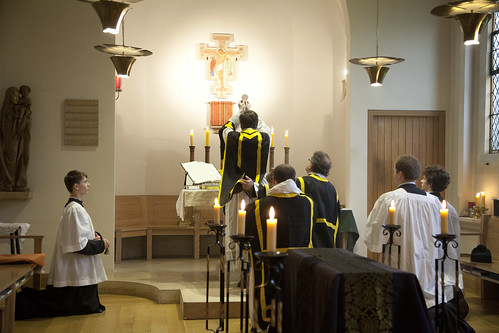 |
| Mass last Saturday: annual Requiem in St Benet's Hall, Oxford. |
My latest on Voice of the Family
If one is to live a Christian life, let alone evangelise in some small way, one has to recognise the unique challenges of one’s time and place. At all times and in all places there is the reality of Original Sin, one’s own sin and the sin of others. For the last century or so, we in the West have also had to live with the fact that being any kind of Christian, and perhaps particularly being Catholic, is regarded by most people as either incomprehensible or malign. In the words of Hilary Mantel, the much-lionised, best-selling author of historical fiction, which twists the narrative to demonise St Thomas More, being a Catholic is not “respectable”.
Mantel, like the author Philip Pullman, seems to have “issues”, as the modern jargon has it, with Catholic faith and culture. She has no intrinsic significance — there have always been strange people around — what is important is the use which has been made of her: she has been awarded all kinds of prizes and her repulsive novels have been adapted for the Royal Shakespeare Company. Pullman, another winner of multiple awards, has had one book made into a film and another into a play. Both writers have received the accolade of special editions of their works done for the bibliophiles of the Folio Society.
The publicity machines have nevertheless found it difficult to explain these peculiar individuals. Mantel was initially praised for the historical accuracy and realism of her work but, as real historians began to notice her material, she hastily rebranded it as a very fictional kind of historical fiction. After pocketing prizes for children’s books, Pullman decided, as his graphic descriptions of child torture began to get a bit out of hand, that this was just a misunderstanding; no, he was writing for adults.
Such U-turns would have sunk lesser folk, but the secularist establishment needs Mantel and Pullman. They possess some literary skill and their work can be used to counter-balance and even to exclude the Christian narratives given to us by writers of a previous generation: notably, Robert Bolt’s play and film, A Man for All Seasons, about St Thomas More, and the children’s books of C.S. Lewis. Literature and historical memory is being remade in the snarling image of secular modernity.
Mantel, like the author Philip Pullman, seems to have “issues”, as the modern jargon has it, with Catholic faith and culture. She has no intrinsic significance — there have always been strange people around — what is important is the use which has been made of her: she has been awarded all kinds of prizes and her repulsive novels have been adapted for the Royal Shakespeare Company. Pullman, another winner of multiple awards, has had one book made into a film and another into a play. Both writers have received the accolade of special editions of their works done for the bibliophiles of the Folio Society.
The publicity machines have nevertheless found it difficult to explain these peculiar individuals. Mantel was initially praised for the historical accuracy and realism of her work but, as real historians began to notice her material, she hastily rebranded it as a very fictional kind of historical fiction. After pocketing prizes for children’s books, Pullman decided, as his graphic descriptions of child torture began to get a bit out of hand, that this was just a misunderstanding; no, he was writing for adults.
Such U-turns would have sunk lesser folk, but the secularist establishment needs Mantel and Pullman. They possess some literary skill and their work can be used to counter-balance and even to exclude the Christian narratives given to us by writers of a previous generation: notably, Robert Bolt’s play and film, A Man for All Seasons, about St Thomas More, and the children’s books of C.S. Lewis. Literature and historical memory is being remade in the snarling image of secular modernity.
Robert Bolt's A Man for All Seasons is not a "Christian narrative". The agnostic Bolt rewrote the true historical story of More as a martyr for the truth of Catholicism, into a martyr for the absolute primacy of individual conscience, informed or not. This is fiction.
ReplyDeleteBolt's narrative is not Catholic, but it allows for the Catholic heroism of More to be seen.
ReplyDeleteThe difference between Bolt's generation and Mantel's is encapsulated in the fact that even a man like Bolt could find More heroic. Mantel must have him as a villain.
Look how far we have come--and see how much further we have to fall.